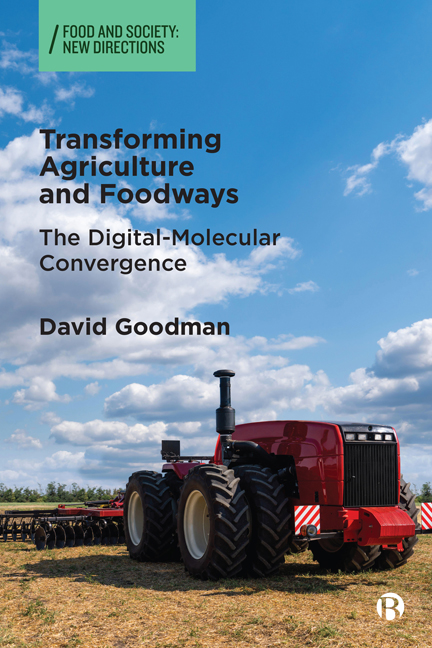Book contents
- Frontmatter
- Dedication
- Contents
- Series Preface
- List of Abbreviations
- Acknowledgements
- 1 Introduction: Technological Convergence and Change in Modern Agro-Food Systems
- 2 Precision Agriculture: Big Data Analytics, Farm Support Platforms, and Concentration in the AgTech Space
- 3 Precision Agriculture: Adoption, ‘Re-Scripting’, Farmer Identity, Path Dependence, and ‘Appropriationism 4.0’
- 4 Alternative Proteins: Bio-Mimicry, Structuring the New Protein Industry, ‘Promissory Narratives’, and ‘Substitutionism 4.0’
- 5 Agri-Biotechnology and the Failed Promises of the Seed-Chemical Complex, CRISPR and Gene Editing, and Regulatory Capture
- 6 Between Physical Space and Digital Space: COVID-19, Platform Capitalism, and Changing Patterns of Food Provisioning
- 7 Conclusion: Continuities in Change and Lost Opportunities
- Postscript
- Notes
- References
- Index
6 - Between Physical Space and Digital Space: COVID-19, Platform Capitalism, and Changing Patterns of Food Provisioning
Published online by Cambridge University Press: 18 January 2024
- Frontmatter
- Dedication
- Contents
- Series Preface
- List of Abbreviations
- Acknowledgements
- 1 Introduction: Technological Convergence and Change in Modern Agro-Food Systems
- 2 Precision Agriculture: Big Data Analytics, Farm Support Platforms, and Concentration in the AgTech Space
- 3 Precision Agriculture: Adoption, ‘Re-Scripting’, Farmer Identity, Path Dependence, and ‘Appropriationism 4.0’
- 4 Alternative Proteins: Bio-Mimicry, Structuring the New Protein Industry, ‘Promissory Narratives’, and ‘Substitutionism 4.0’
- 5 Agri-Biotechnology and the Failed Promises of the Seed-Chemical Complex, CRISPR and Gene Editing, and Regulatory Capture
- 6 Between Physical Space and Digital Space: COVID-19, Platform Capitalism, and Changing Patterns of Food Provisioning
- 7 Conclusion: Continuities in Change and Lost Opportunities
- Postscript
- Notes
- References
- Index
Summary
Several common themes recur as we move from upstream sectors to the digitalisation of food services, distribution, and consumption practices.1 These include the rising ubiquity of digital platforms, consolidation in digital markets, increasing use of AI and robotics, and the worsening of long-standing structural fault lines: food poverty, health inequalities and the erosion of public safety nets. The COVID-19 pandemic cuts across these tendencies at random, amplifying early emerging trends with transformative force in some sectors while imposing difficult processes of adjustment on others.
As we explore how digitally mediated, platform-based food distribution and consumption practices are re-configuring the downstream food system, the COVID-19 pandemic is a constant and active presence. At the macro level, the pandemic is a disruptive force, exacerbating the multi-faceted global climate crisis but, in a sectoral context, disruptive change is a source of socio-technical opportunity, both of which heighten the existing inequalities and disparities in the food system. Buffeted by the vagaries of the pandemic, downstream sectors face an uncertain future as new actors challenge established ways of doing business.
The intensification of our digital engagements with food provoked by COVID-19, such as the remarkable rise of ordering-in meals at the expense of dining-out and takeaways, builds on the socio-technological infrastructures of the Internet, the mainstreaming of the World Wide Web in the mid-1990s, the mass-market diffusion of personal computers, and the expansion of social media platforms in the early 2000s. Gradually but inexorably, the digital has become entwined with “everyday food practices and experiences” (Lewis, 2020: 2), stimulating the proliferation of diverse “digital food cultures” (Lupton and Feldman, 2020). More specifically, “Over the past decade, the world of food, from grocery shopping and home cookery to restaurant going to food politics has been quietly colonised by the digital. Meanwhile, the digital has been invaded by all things food related” (Lewis, 2020: 2). Developments central to today's digital food practices also emerged gradually in the 2000s as part of this wider societal digitalisation, such as online grocery shopping and third-party home food delivery services. Two pioneers and current market leaders in app-based home food delivery – Takeaway and GrubHub – were established at that time, well before the explosive growth and takeover frenzy of 2020– 2021.
- Type
- Chapter
- Information
- Transforming Agriculture and FoodwaysThe Digital-Molecular Convergence, pp. 71 - 87Publisher: Bristol University PressPrint publication year: 2023



